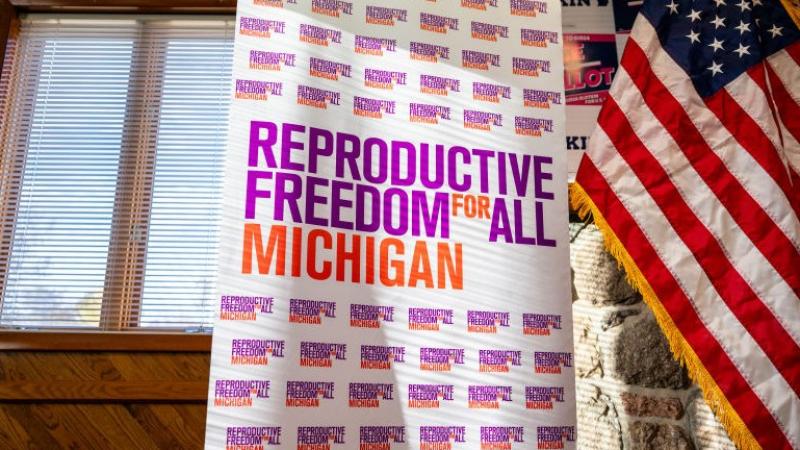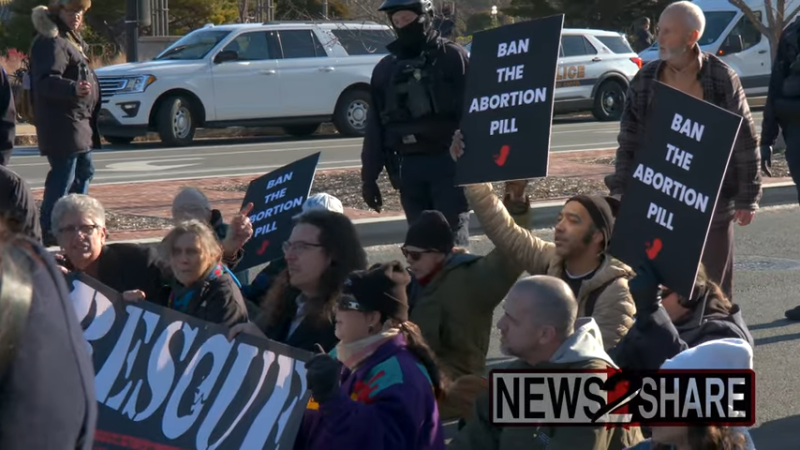Biden DOJ's prosecution error could threaten federal law used to prosecute pro-life activists
Steven Lefemine didn't seek Trump pardon so he could challenge Freedom of Access to Clinic Entrances Act, and inexplicable "intimidation" claim in indictment could give him legal right to make his argument to jury.
When President Trump issued pardons to 23 pro-life activists convicted under the federal Freedom of Access to Clinic Entrances Act for nonviolent resistance at abortion clinics, a 24th name was conspicuously absent.
South Carolina's Steven Lefemine, dubbed a longtime "Bible-quoting, hymn-singing, Constitution-citing anti-abortion activist" by The State, didn't apply for a pardon so he could appeal his March 2024 conviction to the 4th U.S. Circuit Court of Appeals, arguing the Supreme Court's elimination of federal abortion rights in Dobbs nullified the FACE Act.
Having represented himself in his bench trial and sentencing before Senior U.S. District Judge Joseph Anderson, paying a $1,000 fine and serving 60 days in prison, Lefemine now has a real lawyer who is seeking a more incremental victory: a jury trial.
That would put the Trump administration in the awkward position of convincing a jury to preserve the Biden administration's conviction of 69-year-old Lefemine after the president put an end to FACE Act enforcement and said those he pardoned, "many of them" elderly, "should not have been prosecuted."
The Justice Department put the pro-prayer president in a similarly awkward position at the Supreme Court this week, arguing that a Christian evangelist who was arrested and paid a fine for preaching outside the boundaries of a remote "protest" zone should not be able to pursue federal civil rights claims against local officials because he was never incarcerated.
Lefemine's court-appointed lawyer, Jim Brown, sought to convince a three-judge panel of the 4th Circuit Friday that his indictment unambiguously accused Lefemine of intimidation, meaning he faced a one-year sentence that SCOTUS says guarantees a jury trial, despite only alleging nonviolent actions by Lefemine.
Biden's DOJ never filed an amended indictment removing intimidation, despite saying it would, and Judge Anderson "did try the case as if it had been amended," telling Lefemine he was facing only six months, too short for a jury trial.
The President Reagan nominee even stopped Lefemine from examining a witness about whether he made any threats or used force at Columbia Planned Parenthood, telling Lefemine "you're not charged with that," then further confused the issue at sentencing by "just recit[ing] the indictment language," which still "formalistically alleged" intimidation, Brown said.
"It would be hard-pressed for me to tell a client who came in with that indictment he did not face one year," Brown told the judges. DOJ "would never go back and look at Judge Anderson's order" specifying a six-month maximum.
"On the record the court accepted them taking off" the intimidation claim, said Judge Allison Rushing, nominated by Trump. The government was supposed to file an amended indictment "soon" but "if you never file it there's never an amendment to it," Brown said.
The government says an "amended penalty sheet was there," responded Judge DeAndrea Benjamin, nominated by Biden. President Clinton-nominated Judge Robert King noted that Anderson cited the 2nd, 7th and 11th Circuits to justify his authority to define the maximum as six months, since the 4th Circuit hasn't decided the issue.
'It's a strange situation ... but the face of the indictment is hard to get around'
"It is a bit odd the way the statute is set up," conceded Assistant U.S. Attorney DeWayne Pearson, who served under President Obama, prosecuted Lefemine under Biden and now remains under Trump.
The FACE Act prohibits any action "by force or threat of force," as well as "by physical obstruction," that "attempts to injure, intimidate or interfere with" a person seeking or providing an abortion. It defines "intimidate" – the charge left in Lefemine's indictment – as putting someone in "reasonable apprehension of bodily harm."
The one-year prison maximum for a "first offense" in section (b)(1) is followed by an unenumerated paragraph that lays out what Pearson called "flesh language": a six-month maximum sentence for "an offense involving exclusively a nonviolent physical obstruction," which matches the specific facts DOJ put forth against Lefemine – blocking doors.
The 4th Circuit's description of the question in the case matches DOJ's: "Whether defendant charged with exclusively nonviolent violation … is entitled to jury trial."
Pearson struggled to explain to Judge Rushing why he never filed an amended indictment omitting intimidation. "Better practice would have been to strike it," but "we were clear in going the extra step" to specify factual allegations of interference – "making it difficult" to get through the doors — not intimidation.
"But doesn't it, like, a sentence before, allege intimidation?" Rushing responded. If the government wanted a longer prison sentence, it would have to allege facts to show intimidation such as brandishing a weapon, Pearson said, but Rushing was still incredulous that "an extra sentence" about blocking doors limited the sentence to six months.
"It's a strange situation" in which a defendant wants a longer sentence to secure a jury trial, so Rushing understands why DOJ would think "everybody's gonna be on board with this, but the face of the indictment is hard to get around."
Lefemine was "never under the impression" he was facing a year in prison, and even corrected Judge Anderson at his initial appearance when the 75-year-old jurist said the self-represented defendant was facing a year, Pearson said.
He pointed to Rule 7(c)(2) in federal criminal procedure, which says unless a defendant was "misled and thereby prejudiced, neither an error in a citation nor a citation’s omission is a ground to dismiss the indictment or information or to reverse a conviction."
Just as Judge Rushing had harped on the indictment at face value, Judge King emphasized the literal words of the trial judge confirming a six-month penalty.
"You have to read the whole indictment," including the alleged facts, 85-year-old King lectured Brown. "Judge Anderson didn't come over on the pickle boat," he said, an expression meaning something like a foolish person.
The Facts Inside Our Reporter's Notebook
Videos
Links
- President Trump issued pardons to 23 pro-life activists
- The State
- $1,000 fine and serving 60 days
- should not be able to pursue federal civil rights claims against local officials
- Jim Brown
- SCOTUS says guarantees a jury trial
- prosecuted Lefemine under Biden
- FACE Act
- Rule 7(c)(2) in federal criminal procedure
- expression meaning something like a foolish person















